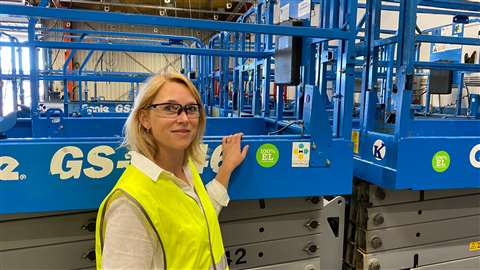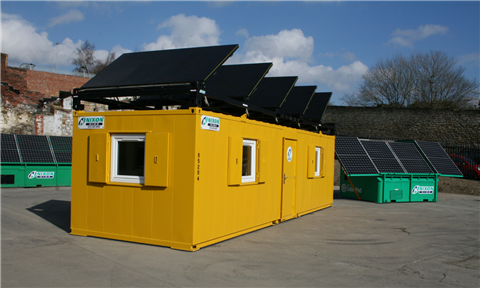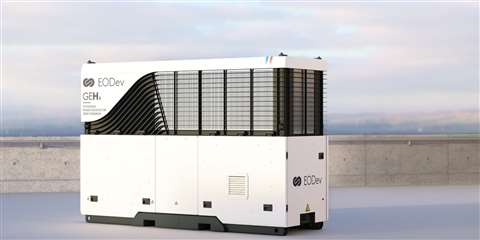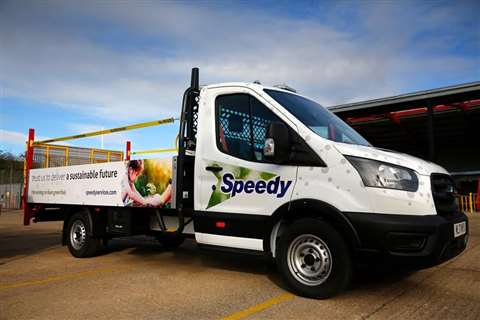How are alternative fuels being used in equipment rental?
01 February 2023
With OEMs under ever increasing pressure to reduce carbon emissions, the fuel landscape in the construction industry is becoming more fragmented now than ever before in living memory.
KHL writer Lucy Barnard asks how rental firms are choosing between electric, hybrid, hydrogen, LPG and HVO and helping customers navigate the complicated route to net zero.
Petra Lampa, sustainability officer at Kranpunkten, points proudly to the Genie electric scissor lift behind her at the firm’s headquarters in Förslöv in Southern Sweden.
“Our opinion is that the industry should be at the forefront [of cutting carbon emissions],” she says firmly.
For Kranpunkten, which specialises in aerial platforms, telehandlers and other lifting equipment which it rents out throughout Sweden and other Nordic markets through eight depots, transitioning its rental fleet from traditional diesel to alternative fuels is a central part of company strategy.
Currently, Lampa says, around 84% of the 4,000 machines in its fleet are run using electric or hybrid power while the remainder are run using low-carbon alternatives.
 Kranpunkten sustainability officer Petra Lampa demonstrates the company’s fleet of electric scissor lifts. Photo: Kranpunkten
Kranpunkten sustainability officer Petra Lampa demonstrates the company’s fleet of electric scissor lifts. Photo: Kranpunkten
“Kranpunkten’s ambition is to invest in fully electric machines, as far as possible,” Lampa adds. “The machine manufacturers have a responsibility in driving development to be able to offer sustainable machine alternatives to a greater extent.”
Certainly, Kranpunkten’s ambitions marks a sea change from the situation just a couple of years ago.
At the time, aside from a few construction machines traditionally fuelled by lead acid batteries such as electric scissor lifts, most rental fleets were almost exclusively powered by diesel.
Instead, a quick look at the websites of the world’s largest rental outfits reveals that the fuel landscape for the construction industry is becoming more fragmented now than ever before in living memory.
Rental firms are reporting that demand from customers for alternatively powered construction machines is growing rapidly, fuelled by both environmental and economic pressures.
”We are increasingly finding demand for alternative energy is two-pronged – motivated by both efficiency and sustainability aims,” says Nicolas Protais, managing director of Aggreko, which designs and manufactures its own rental equipment for producing and storing temporary power.
”Firstly, the commitment of organisations across industry to make the net zero journey, due to shifts in company cultures and regulatory pressures, has been evident. This has driven uptake of greener technologies and alternative energy provisions,” he says.
Battery-powered rental machinery
“Secondly, with rising utility costs hitting businesses’ bottom-lines, optimising performance and energy efficiency has become increasingly important,” Protais says.
“This is generating immediate adoption of more environmentally-friendly technologies, which can be integrated into existing systems. Moreover, reliance on the national grid is initiating considerations for innovative strategies, such as hybrid systems powered by greener fuels.”
For Kranpunkten, battery-powered electric machines are the obvious choice, enabling customers to reduce their carbon footprints and helping them to win tenders which would otherwise not be possible.
“Our customers place greater demands on documentation regarding sustainability linked to the rental process,” she says. “For our large customers, the use of environmentally and energy-saving units is an absolute requirement. There is also demand among smaller customers.”
 Mauro Mollo, president of Mollo Noleggio has invested heavily in an alternatively powered fleet. Photo: Mollo Noleggio
Mauro Mollo, president of Mollo Noleggio has invested heavily in an alternatively powered fleet. Photo: Mollo Noleggio
Mauro Mollo is president of Italian rental company Mollo Noleggio which has invested heavily in an alternatively powered fleet which includes a fully electric telescopic handler, a mini excavator, mini dump truck, vibrating plate, electric rammer all powered by lithium battery, as well as a 16 m hybrid truck-mounted aerial platform and a plug-in hybrid light tower with dual power supply.
He says that the benefits of using an electric battery as a power source include the fact that machines themselves often have zero emissions so they produce no pollution.
They are also usually quieter than their diesel alternatives which means they can often be used at times and settings which would otherwise be prohibited.
Hybrid machines which can use either diesel or batteries as a power source or switch between the two as required are also becoming more and more popular.
He says that new environmental regulations put in place by public authorities are prompting contractors to rent alternatively fuelled construction machines as a way of securing certain types of work.
”Nowadays It wouldn’t be possible to work inside a food or pharmaceutical industry without having an electrical vehicle,” he says.
“The same applies not only for health/hospital facilities but also for historical urban centres, where the ZTL (Restricted Traffic Zone) imposes the use of certain types of engines and low levels of noise pollution.”
”The electric engine is the solution that has always allowed people to work indoors, nowadays it also meets the needs of machines with zero CO2 emissions and noise in open contexts, as an example in urban centres and during night work,” he adds. ”
The challenges involved with providing customers with the capacity to charge their electric fleet at each work site are also affecting fleet composition, with on-site battery storage solutions often becoming a key part of a rental company’s offering.
On-site battery storage
Some of the most technologically advanced of these include United Rentals, the world’s largest rental company.
The company announced in March that it has added Powrbank battery systems from manufacturer POWR2 which work with diesel generators by storing excess energy and enabling the generator to shut off when not needed.
Similarly, UK-based temporary power specialist Aggreko last year rolled out a 30-90 kVA lithium-iron-phosphate (LFP) battery system which it says enables customers to reduce generator run times by up to 80%.
Elsewhere rental firms have been offering solar options to power electric equipment. Rental firms including United Rentals, Boels and Speedy have all added solar powered or hybrid lighting towers and generators to their fleets.
In fact, in June, Boels announced it had expanded its ECO label product offering with the addition of 4x60W LED solar powered lighting towers mounted on trailers to add to its stationary models.
 Nixon Hire’s renewables fleet includes cabins and toilet blocks with solar panels mounted on the roofs. Photo: Nixon Hire
Nixon Hire’s renewables fleet includes cabins and toilet blocks with solar panels mounted on the roofs. Photo: Nixon Hire
Meanwhile, UK rental company Nixon Hire, which supplies site equipment including plant, site accommodation and portable toilets, went one further by placing a significant order with manufacturer Prolectric to add the ProPower solar hybrid generator to its renewables fleet.
Its fleet already includes a range of solar charging stations and a series of cabins and toilet blocks with solar panels mounted on the roofs to provide power.
What is the cost of alternative fuels?
The big problem for rental firms is that electric machines are more expensive to purchase then their diesel alternatives, leaving them facing a dilemma of how to pass on these additional costs to customers.
When it launched in October 2021, Volvo’s new battery powered ECR excavator was listed at $92,900, while its diesel alternative could be purchased for roughly a third of that.
Similarly, a JCB diesel powered HTD5 tracked dumpster currently retails for around £7,700 while its electric equivalent, a HTD5E tracked dumpster retails for more than twice the amount at £18,609.
Although comparisons can be difficult to make due to differences in availability and with machines themselves, renting electric or hybrid equipment can cost significantly more per day than diesel-powered machines.
At Netherlands-headquartered Boels Rental, which prides itself on having one of the largest fleets of electric construction machinery to hire in Europe, the cost of hiring a 1.9 tonne electric mini excavator with a cab is listed on the website at €352.88 per day – nearly twice as much as the nearest diesel powered equivalent – a 1.5 tonne mini excavator with cab which is listed at costing from €181.50 a day.
“Yes, it’s true – a zero emission machine still has a higher rental price than its fuel-powered counterpart. Not surprising of course. Not many of them are being produced at this point, development is ongoing, and batteries are still expensive.
“For the time being this means a higher purchase price,” says John Smeets, technical manager at Boels.
Rental charges: diesel vs. electric
He adds that, despite the higher rental charges, customers are likely to save money in the long run through lower running costs. “Electricity is cheaper than diesel, which is certainly expensive now. Maintenance is much cheaper. There are fewer moving parts that need lubrication.
“There is also no need to change filters and oil (except for hydraulic oil). And the service life of an electric drive is much longer while it works more quietly – and cleaner to boot.”
Kranpunkten’s Lampa agrees that diesel powered boom lifts at the company are “somewhat cheaper” to rent than their electric/hybrid alternatives. However, she adds that this price differential is “marginal.”
Moreover, for large rental companies with big balance sheets, having the fire power to be able to afford the significant price tags of new electric equipment acts as a differentiator in a highly competitive market.
Nonetheless, most rental firms agree that electrification is just part of the story with firms also investing in various other methods of powering construction machinery.
For many in the construction sector, the most eagerly awaited alternative fuel is hydrogen, a fuel which when combined with oxygen to generate electricity, emits just water and heat as its by-products, promising incredible potential as a sustainable and climate-friendly fuel.
 United Rentals’ hydrogen powered EODev generators will produce zero-emissions energy. Photo: United Rentals
United Rentals’ hydrogen powered EODev generators will produce zero-emissions energy. Photo: United Rentals
In October, United Rentals, the world’s largest rental company announced it was adding a range of hydrogen-powered zero-emissions EODev generators to its North American rental fleet, enabling customers to produce energy without emissions of carbon dioxide, hydrocarbons, nitrogen oxides or other particulate matter.
United Rentals said that the generators, which measure 4 feet by 11 feet and deliver power of up to 88kW, can be used on worksites and in confined environments such as tunnels, mines and enclosed spaces and entertainment venues.
”These generators will help] worksites expand electrification in construction and industrial rental sectors,” said David Scott, senior vice president of speciality operations at United Rentals.
”We can assist companies as they work to close the sustainability loop y providing the power they need without generating harmful emissions to charge electric vehicles and equipment and more.”
Other rental firms have also invested heavily in hydrogen as an alternative fuel.
In June 2021, Aggreko undertook its first pilot project of a 50kVA hydrogen combustion power generation unit at its depot in Moerdijk, Netherland. The company says it is now further investing in installations across Europe.
However, Protais says that current logistical issues are posing obstacles to widescale uptake. ”Hydrogen needs to be made dense for transportation, which is achieved by increasing its pressure as a gaseous state or cooling it to -253°C as a liquid,” he says.
”The adoption of hydrogen energy will ultimately be gradual, and this will rely on better knowledge of and increased investment in storage and transport infrastructure.”
Low carbon alternative fuels
And certainly although hydrogen remains a major focus for OEMs including Volvo CE, JCB and engine manufactureres Cummins and Deutz, other hydrogen powered construction machines currently remain some way off mass production.
And, as rental firms attempt to transition towards fleets powered by electricity and hydrogen, many are looking for ’low carbon’ alternatives such as hydrotreated vegetable oil (HVO) or natural gas which are less polluting than traditional diesel and can often be used in unmodified diesel engines as an alternative.
HVO, a diesel alternative made from waste vegetable and animal fats can be used as a drop-in replacement for diesel or blended with traditional diesel and used.
Manufacturers say that it produces 90% less carbon than diesel and burns more cleanly, reducing other emissions such as nitrogen oxide and carbon monoxide.
 UK-based equipment rental company Speedy announced Green D+ enhanced HVO as its preferred fuel in September 2020. Photo: Speedy
UK-based equipment rental company Speedy announced Green D+ enhanced HVO as its preferred fuel in September 2020. Photo: Speedy
Kranpunkten says it has switched its remaining combustion engine-powered machines to HVO while major rental companies offering the alternative fuel include Sunbelt Rentals and Speedy.
”HVO-fuelled generators have played a leading role in the recent decarbonisation of our fleet,” says Aggreko’s Protais.
”As part of our Greener Upgrades initiative, HVO uptake has risen rapidly across Aggreko’s rental fleet, with any customer using the fuel management service automatically receiving HVO deliveries.
“Being able to incorporate HVO into backup power procedures means green developments are being adopted across the day-to-day operation of organisations.”
Although still carbon-based, natural gas is another alternative fuel which is being used by rental companies as an alternative to diesel.
Stored as a gas, gas to liquid (GTL) fuel is a synthetic diesel alternative which burns more cleanly and can be used either insead of or alongside traditional diesel to reduce emissions.
”One development Boels is currently working on is replacing traditional diesel fuel by alternative low-emission fuels such as GTL and HVO. The latest Stage V engines make this possible – and it won’t surprise you to learn that we are seeing more and more of these in the Boels rental fleet,” says Smeets.
Mollo says that alongside its electric and hybrid fleet, his company has also invested in a bi-fuel tipper truck, capable of running on diesel as well as LPG. ”Customers are increasing their interest in bi-fuel and hybrid engines,” he says.
What role does rental have in the adoption of emission-free construction equipment?
Whatever intermediate fuels and technologies they choose, Smeets argues that rental companies have a huge role to play in helping customers to navigate the route to net zero by championing the most climate friendly machinery in a world where customers are confronted with divergent and sometimes temporary technologies which they would be otherwise unlikely to incorporate into their own fleets.
“Our role as advisers is becoming increasingly important in order to serve our customers,” he says. “That’s why we always need to stay one step ahead in terms of knowledge and experience, so that we can give our customers sound advice on all these innovations.”
“By opting for rental instead of purchase, companies can speed up the transition towards emission-free construction,” Smeets says: “It often takes some getting used to. Our kids will have a lot less trouble with it later on. For them it’s almost natural to think and act green.”
POWER SOURCING GUIDE
The trusted reference and buyer’s guide for 83 years
The original “desktop search engine,” guiding nearly 10,000 users in more than 90 countries it is the primary reference for specifications and details on all the components that go into engine systems.
Visit Now
STAY CONNECTED




Receive the information you need when you need it through our world-leading magazines, newsletters and daily briefings.
CONNECT WITH THE TEAM









